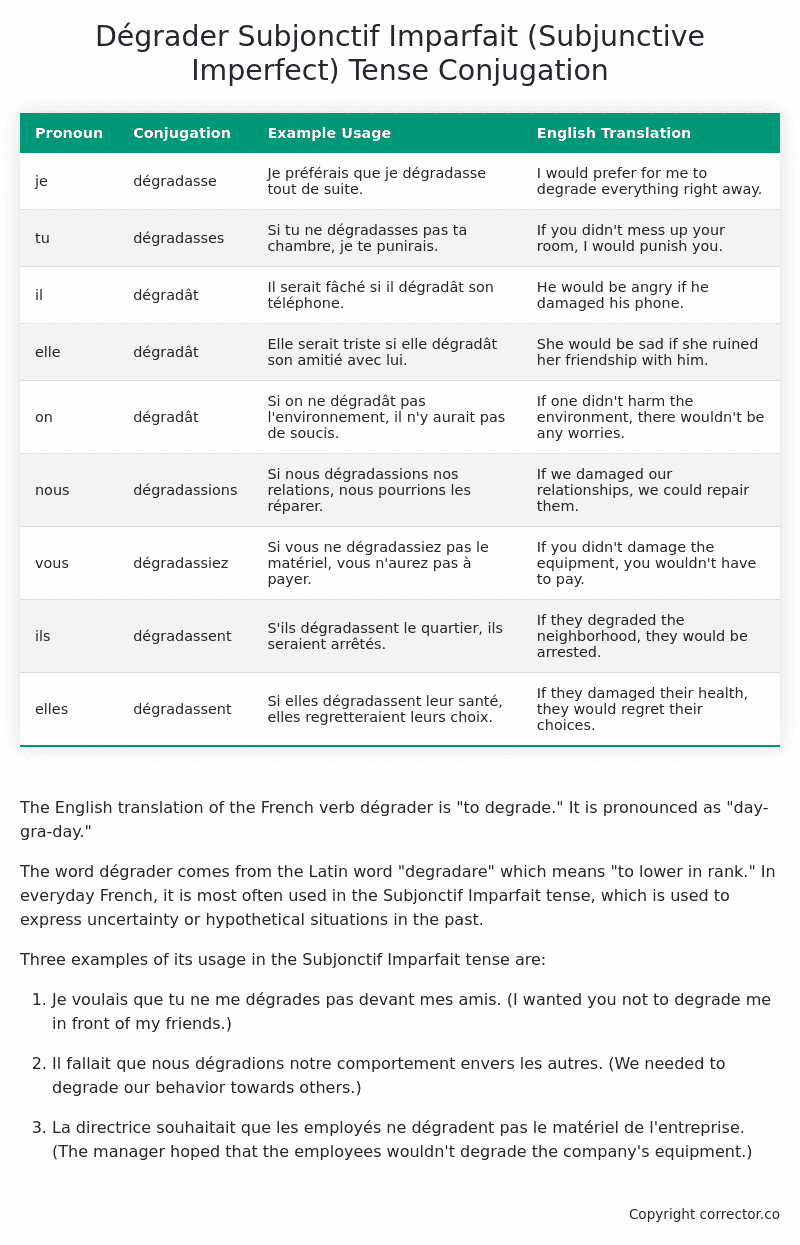Subjonctif Imparfait (Subjunctive Imperfect) Tense Conjugation of the French Verb dégrader
Introduction to the verb dégrader
The English translation of the French verb dégrader is “to degrade.” It is pronounced as “day-gra-day.”
The word dégrader comes from the Latin word “degradare” which means “to lower in rank.” In everyday French, it is most often used in the Subjonctif Imparfait tense, which is used to express uncertainty or hypothetical situations in the past.
Three examples of its usage in the Subjonctif Imparfait tense are:
-
Je voulais que tu ne me dégrades pas devant mes amis. (I wanted you not to degrade me in front of my friends.)
-
Il fallait que nous dégradions notre comportement envers les autres. (We needed to degrade our behavior towards others.)
-
La directrice souhaitait que les employés ne dégradent pas le matériel de l’entreprise. (The manager hoped that the employees wouldn’t degrade the company’s equipment.)
Table of the Subjonctif Imparfait (Subjunctive Imperfect) Tense Conjugation of dégrader
| Pronoun | Conjugation | Example Usage | English Translation |
|---|---|---|---|
| je | dégradasse | Je préférais que je dégradasse tout de suite. | I would prefer for me to degrade everything right away. |
| tu | dégradasses | Si tu ne dégradasses pas ta chambre, je te punirais. | If you didn’t mess up your room, I would punish you. |
| il | dégradât | Il serait fâché si il dégradât son téléphone. | He would be angry if he damaged his phone. |
| elle | dégradât | Elle serait triste si elle dégradât son amitié avec lui. | She would be sad if she ruined her friendship with him. |
| on | dégradât | Si on ne dégradât pas l’environnement, il n’y aurait pas de soucis. | If one didn’t harm the environment, there wouldn’t be any worries. |
| nous | dégradassions | Si nous dégradassions nos relations, nous pourrions les réparer. | If we damaged our relationships, we could repair them. |
| vous | dégradassiez | Si vous ne dégradassiez pas le matériel, vous n’aurez pas à payer. | If you didn’t damage the equipment, you wouldn’t have to pay. |
| ils | dégradassent | S’ils dégradassent le quartier, ils seraient arrêtés. | If they degraded the neighborhood, they would be arrested. |
| elles | dégradassent | Si elles dégradassent leur santé, elles regretteraient leurs choix. | If they damaged their health, they would regret their choices. |
Other Conjugations for Dégrader.
Le Present (Present Tense) Conjugation of the French Verb dégrader
Imparfait (Imperfect) Tense Conjugation of the French Verb dégrader
Passé Simple (Simple Past) Tense Conjugation of the French Verb dégrader
Passé Composé (Present Perfect) Tense Conjugation of the French Verb dégrader
Futur Simple (Simple Future) Tense Conjugation of the French Verb dégrader
Futur Proche (Near Future) Tense Conjugation of the French Verb dégrader
Plus-que-parfait (Pluperfect) Tense Conjugation of the French Verb dégrader
Passé Antérieur (Past Anterior) Tense Conjugation of the French Verb dégrader
Futur Antérieur (Future Anterior) Tense Conjugation of the French Verb dégrader
Subjonctif Présent (Subjunctive Present) Tense Conjugation of the French Verb dégrader
Subjonctif Passé (Subjunctive Past) Tense Conjugation of the French Verb dégrader
Subjonctif Imparfait (Subjunctive Imperfect) Tense Conjugation of the French Verb dégrader (this article)
Subjonctif Plus-que-parfait (Subjunctive Pluperfect) Tense Conjugation of the French Verb dégrader
Conditionnel Présent (Conditional Present) Tense Conjugation of the French Verb dégrader
Conditionnel Passé (Conditional Past) Tense Conjugation of the French Verb dégrader
L’impératif Présent (Imperative Present) Tense Conjugation of the French Verb dégrader
L’infinitif Présent (Infinitive Present) Tense Conjugation of the French Verb dégrader
Struggling with French verbs or the language in general? Why not use our free French Grammar Checker – no registration required!
Get a FREE Download Study Sheet of this Conjugation 🔥
Simply right click the image below, click “save image” and get your free reference for the dégrader Subjonctif Imparfait tense conjugation!

Dégrader – About the French Subjonctif Imparfait (Subjunctive Imperfect) Tense
Formation
Common Everyday Usage Patterns
Interactions with Other Tenses
Subjonctif Présent
Indicatif Passé Composé
Conditional
Conditional Perfect
Summary
I hope you enjoyed this article on the verb dégrader. Still in a learning mood? Check out another TOTALLY random French verb conjugation!


